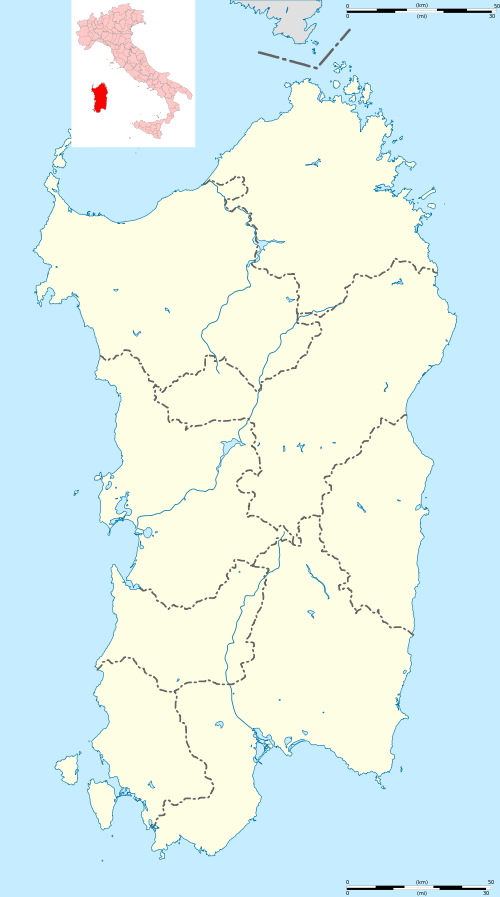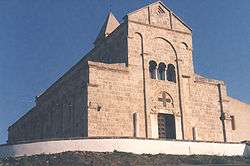Santa Giusta
| Santa Giusta Santa Justa | ||
|---|---|---|
| Comune | ||
| Comune di Santa Giusta | ||
|
view of Santa Giusta Cathedral | ||
| ||
 Santa Giusta Location of Santa Giusta in Sardinia | ||
| Coordinates: 39°53′N 8°37′E / 39.883°N 8.617°ECoordinates: 39°53′N 8°37′E / 39.883°N 8.617°E | ||
| Country | Italy | |
| Region | Sardinia | |
| Province / Metropolitan city | Oristano (OR) | |
| Frazioni | Cirras, Corte Baccas | |
| Government | ||
| • Mayor | Antonello Figus | |
| Area | ||
| • Total | 69.2 km2 (26.7 sq mi) | |
| Population (Dec. 2004)[1] | ||
| • Total | 4,592 | |
| • Density | 66/km2 (170/sq mi) | |
| Demonym(s) | Santagiustesi | |
| Time zone | CET (UTC+1) | |
| • Summer (DST) | CEST (UTC+2) | |
| Postal code | 09096 | |
| Dialing code | 0783 | |
| Patron saint | Santa Giusta | |
| Website | Official website | |
Santa Giusta (Sardinian: Santa Justa) is a comune (municipality) in the Province of Oristano in the Italian region of Sardinia, located about 90 kilometres (56 miles) northwest of Cagliari and about 3 km (2 mi) southeast of Oristano in the Campidano area. As of 31 December 2004, it had a population of 4,592 and an area of 69.2 square kilometres (26.7 sq mi).
History
The site of the Phoenician port of Othoca[2] is thought to be at the bottom of a lake separated from the Mediterranean by a small isthmus, and modern Santa Giusta occupies some ancient sites. Previous excavations recovered 50 amphorae and the first chamber tomb of Phoenician origin found in Italy. Archaeologists led by Carlo del Vais of the University of Cagliari plan to excavate a portion of the lake where 100 amphorae appear to be located on a wooden platform covered by a thick mud layer.[3]
Main sights
- Santa Giusta Cathedral, former cathedral and now a minor basilica, an important Romanesque church
References
| Wikimedia Commons has media related to Santa Giusta. |
- ↑ All demographics and other statistics: National Institute of Statistics (Italy) (Istat).
- ↑ Richard Talbert, Barrington Atlas of the Greek and Roman World, (ISBN 0-691-03169-X), Map 48.
- ↑ "Excavation planned for Phoenician city." United Press International, 18 Aug. 2007.

